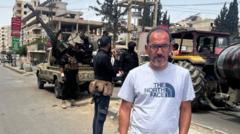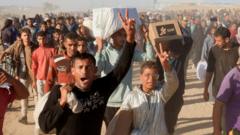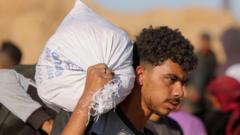On May 9, a BBC Arabic team consisting of a British national, two Iraqi staff, and four Syrian freelancers set out from Damascus to report on the southern province of Deraa and its proximity to the Israeli-occupied Golan Heights. The crew aimed to gather insights about the area following Israel's assumption of control over the territory since December, which followed a shift in the region's governance dynamics after the fall of the Assad regime.
After approaching Quneitra, an area within a UN-monitored buffer zone established by a 1974 agreement, the journalists encountered an unguarded checkpoint where Merkava tanks were stationed. Recognizing their BBC credentials, Israeli forces became hostile shortly after the team began filming.
Within moments, four armed soldiers confronted them, demanding they relinquish their camera gear. Despite attempts to clarify their journalistic intentions, tensions escalated, leading to an alarming sequence of events. After sending a brief communication to colleagues in London, soldiers began to confiscate all their equipment and personal belongings.
The team was then escorted to a crossing point where interrogations commenced. During this time, a soldier aimed his rifle at one journalist's head while they reviewed footage and questioned the crew about their purpose. This terrifying ordeal continued for hours, with threats made against their safety if they ever ventured close to the frontier again.
As concerns grew for the welfare of the detained team, a member emerged from questioning to relay distressing information about their treatment. Although some members were initially treated without the humiliation of blindfolds or ties, all eventually endured invasive searches and interrogations, highlighting the harsh realities journalists face under duress.
Approximately seven hours later, the team was abruptly released in a remote area, left disoriented and without means of communication, ultimately relying on local villagers to navigate back to Damascus. This incident serves as a stark reminder of the perils faced by media crews in conflict zones, where the practice of journalism can lead to dangerous confrontations with military forces.





















